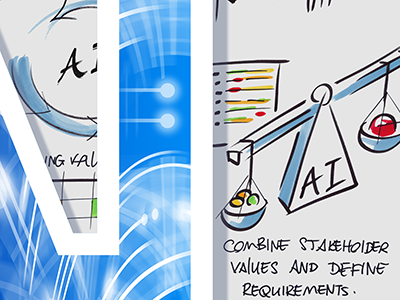Overview
Learn how Artificial Intelligence can be harnessed to transform public services – while safeguarding the core values of equality, transparency, and community.
Note: This course is currently available only for group enrollments. Individual registrations are not possible at this time. Please contact us for more information.
Artificial Intelligence is poised to redefine public administration, with its capabilities to streamline, enhance, and reshape services on an unprecedented scale. Yet, these technological advances present complex challenges that go beyond technical expertise: they call for informed decisions on ethical standards, regulatory requirements, and long-term societal and political impacts.
Public services – which are increasingly under pressure due to changing demographics, rising costs, and greater demands – can be supported and improved with the use of AI tools, but they can also be radically altered as digital and algorithmic tools modify, replace, erode, and renew administrative and bureaucratic processes.
From maintaining integrity and preventing bias in automated decision-making to ensuring compliance with regulations concerning AI, civil servants and public service professionals face unique challenges that demand proactive and critical assessment.
In this course, you will explore how to balance AI-driven innovations with the pressing responsibilities of public service, ensuring that these technologies benefit society without compromising public values such as equality, non-discrimination, and truthfulness. This is especially crucial with so much of the technology coming from the private sector.
Join us to gain a holistic understanding of AI’s implications for public services, and develop the skills needed to make AI work for the public good in a time of rapid technological change.
What You'll Learn
- Identify opportunities to utilize AI & algorithms to enhance public services
- Become aware of potential risks that come with AI & algorithms
- Contextualize the relation between technology and public services
- Apply risk-opportunity frameworks to the use of AI & algorithms
- Critically assess the merits of AI & algorithmic applications
- Frame efforts to regulate AI
 Watch this introductory video for a course overview.
Watch this introductory video for a course overview.![]()
Details
Course Syllabus
- Demystify Artificial Intelligence: Gain an understanding of the technical foundations of AI, the material value chain, and the different approaches used by contemporary AI.
- Explore Positive Use Cases for AI: Explore what type of tasks AI performs well and identify public sector applications that can provide benefits. This includes case studies on some successful existing uses of AI.
- Investigate Negative Use Cases for AI: Identify where AI performs poorly and determine public sector applications that do not stand to benefit from AI application, or where the application of AI could be detrimental. Emphasis is placed on the intersection between AI and inequality.
- Summarize the AI regulatory toolset: Examine the different assessment, audition, accessibility, and fairness methods currently available. An overview of different fairness definitions and ethical considerations is given, this includes a sketch of the existing political landscape around AI regulation.
- Survey the political economy of AI: Engage with the interlinkage between social values and political paradigms with applications of artificial intelligence. Consider how democratic participation and legitimacy can be embedded in AI and examine how AI applications in non-democratic political economies deviate.
Qualifications
Certificates
If you successfully complete this course you will earn a professional education certificate and you are eligible to receive 3.5 Continuing Education Units (CEUs).
Admission
This course is primarily geared towards working professionals.
Prerequisites:
None. This course is, however, specifically targeted at civil servants or people otherwise involved in the public sector.
Contact
If you have any questions about this course or the TU Delft online learning environment, please visit our Help & Support page.



